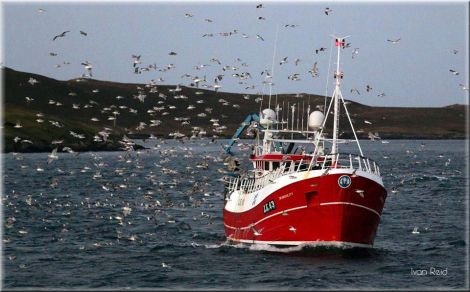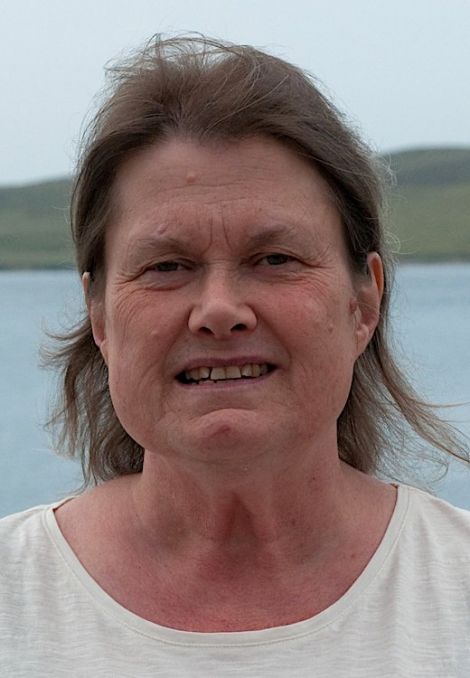Election / Candidates share their views on the fishing and aquaculture sector
Shetland News contacted each of the candidates for the Shetland by-election for their views on the fishing and aquaculture sectors and their prospects in a post-Brexit Britain. Here is what they had to say.
Johan Adamson, Scottish Labour:
“We must protect our food and drink industry in Scotland as it was worth £944 million in 2017, our largest export and a large employer, especially in rural Shetland where for example 50 people are employed in Unst and similar in Yell, and many more across Shetland, in fish farming. Whatever happens with Brexit, these industries will need support in the years to come.
“There is no doubt that the fishermen feel aggrieved at the Common Fisheries Policy (CFP) and have done since the outset. They want to be responsible for managing the EEZ around the UK and believe they can do it better. They feel there is no room to reform the CFP because it will always be all the other countries against the idea. It just so happens our EEZ is where the fish are, so I guess it feels like we’ve had to give away our rights more than others have done.
“Fishermen also feel aggrieved at the discard ban and believe they have submitted better ideas that are not taken on board. They do not see a problem with a no deal Brexit, as the hold ups at ports should not be prohibitive and fact is that the markets want our fish. But, of course, the EEZ could be up for negotiation in any deal. And there is nothing to stop wealthy fishing interests from other countries buying UK quota and therefore market share.
“It does feel incredibly unfair that we had to give up one of our natural resources even if other countries have had to do the same, but also sad that this issue has been one of the factors in any leave vote. A new approach is required within or without the EU.
“The catching sector is valuable to Scotland yet forgotten in our very ‘central belt focused’ government. Companies here want to grow their businesses, and once the new fish markets in Lerwick and Scalloway open they will try to attract all boats to land more fish here.
Become a member of Shetland News
“But for that to happen we need an adequate transport system to cope with that increase, and we currently do not have that support. We are lucky in that local transport companies can prioritise goods but sometimes to the detriment of others – the other trailer that gets left quayside instead of the fish. And if we leave the EU, Shetland Fishermen’s Association also has ideas on how the industry can be supported by government in the future, with the money that would have gone to the EU.
“There is no doubt that with salmon production, companies benefit from the free market in the EU for European exports, but a good quantity of salmon is exported to the US too. Internationally owned salmon farms are in Scotland because the growing conditions are good and that is unlikely to change. The industry is however worried about the geographical indications and want these to be recognised post Brexit. They are also worried about hold ups at ports: again, the markets for their quality product are assured, after some chaos in the interim, if we leave.
“Fresh fish and aquaculture products form Shetland’s biggest export. We can’t afford anything that is going to hinder this valuable industry.”
Brydon Goodlad, Scottish Conservatives:
“Brexit represents a huge opportunity for our fishing industry and it is one that our new Prime Minister is determined to seize. For far too long, our fleets have been at a disadvantage, landing only about 40 per cent of the catch in our own waters. That has to change.
“Post-Brexit, we will have sovereignty over our exclusive economic zone (EEZ) and control over who comes in to fish and how much they catch.
“The PM has been clear we will assume our status as an independent coastal state and negotiate annually on quotas like other non-EU nations such as Norway or the Faroes.
“However, we must also aim to leave with a deal that safeguards our export industries and protects access to markets on the continent.
“Our salmon and shellfish producers cannot be left at a commercial disadvantage – even if we leave without a deal in place.
“In the event of no deal, EU boats would not be permitted, under international law, to fish in our waters until an agreement was in place.
“The UK Government has stepped up preparations for leaving without an agreement on 31 October. We want to secure a deal but it is right and responsible to be ready for the eventuality that an agreement is not reached.
“In this by-election, people in Shetland have a clear choice. The SNP would drag our fishermen back into the Common Fisheries Policy, which has been disastrous for our coastal communities, while the Liberal Democrats would betray the outcome of the UK-wide vote to leave.
“The Scottish Conservatives are the only main party committed to respecting the result of the 2016 referendum and delivering Brexit.
“We will stand up for the Scottish fishing industry and ensure our coastal communities enjoy the benefits of leaving the EU and taking back control of our waters.”
Stuart Martin, UKIP:
“Post-Brexit the fishing industry is worth a potential £6.4 billion from vessel to plate. Over 90 per cent of Scottish fishermen voted out of the EU.
“Eighty per cent of fish sold in the EU comes from British waters. Is anyone seriously saying they won’t buy from Great Britain post-Brexit? Where else will they buy from? They come to our waters because our waters are where the fish are. I have no sympathy for foreign fishermen – they have shown no sympathy for ours over 40 years.
“Post-Brexit the EU won’t be dictating quota; the sustainability of British waters will be decided by fishermen, scientists and the government working together, as happens in Iceland. No British fisherman wants to see the death of the fishing industry, it’s a natural food resource that they want to pass onto their children and grandchildren
“When we are out of the EU we will make our own bi-lateral agreement with Norway. Look to Iceland – they decided more than 40 years ago that the natural food resource swimming around their shores was too precious to lose or hand to a foreign power, hence the cod wars. They had a plan and now have a prosperous industry with well-paid fishermen and industries on the periphery. They export around the world including GB and the EU.
“At the same time GB lost the cod wars, Labour and Conservative governments handed our inshore waters to the EC, fore runner of the EU, and sealed the fate of our fishing industry into a massive decline.
“They paid for boats to be scrapped but allowed the owner or skipper to hold onto the quota creating ‘slipper skippers ‘ and quota became a commodity. Those at sea had to rent quota putting them at a disadvantage with the price of diesel, crew, quota and port fees before making any profit.
“Out of the EU, the British fishing industry could have a massive rise in its fortunes, but it needs politicians with vision and back bone. It will see a rise in its own fortunes and also that of the retailers around the port and also a rise in the fortunes of skills such as engineers, sail makers, radio, ship builders and ship chandlers, etc.
“Our vessels will be able to fish five days a week and not sat in port watching EU vessels fish our waters because our vessels have reached the meagre quota issued by the EU as is the case now. No foreign vessels will fish our waters unless under license agreed by bi-lateral agreement, [such as with] Norway, Denmark, etc.
“We demand a 200 mile EEZ up to the median line as is our right under international law.
“Further recent reports state the EU have failed to plan for a no deal Brexit and they will be hardest hit.
“Are they seriously saying they are to put tariffs on fish and agricultural products?
“No one wants a no deal, but if the EU are not prepared to give us a tariff free deal, then we must be prepared to walk away as in any negotiation deal.
“Taking a ‘no deal’ deal off the table ties both our arms up our back and leaves us to accept any bad deal they offer us, such as Theresa May’s disastrous deal for Great Britain.
“The SNP, Lib-Dems, Labour and Greens all want to hand our fishing industry to the EU. I will fight for the fishing industry!”
Debra Nicolson, Scottish Greens:
“A no deal Brexit will be devastating for fishing and aquaculture in Shetland. The Common Fisheries Policy clearly isn’t perfect, but the proposed post-Brexit bonanza sought by some in the fishing sector is entirely unrealistic and would be completely unsustainable. Whatever Scotland’s future constitutional relationship, we need to work cooperatively with our neighbours, as fish don’t respect international boundaries. The Scottish Greens believe we are best served working co-cooperatively within the EU.
“We must build on existing arrangements, seek to enhance the evidence and ensure that we have in place locally managed fisheries that are able to work within a clear evidence base. We need an enhanced marine protection capability, something my colleague John Finnie MSP has consistently raised in Holyrood. It can’t be right that Wales has a bigger marine protection fleet than Scotland. The current arrangements are clearly insufficient to protect Scotland’s inshore fisheries and growing number of Marine Protected Areas.
“Greens will support our fisheries and aquaculture industry to adhere to the highest possible environmental standards. We’ll fight to keep Scotland at the heart of Europe where these industries can be best assured of a thriving and sustainable future.”
Ian Scott, independent – Fight Austerity:
“Of course we will support all of our industries as much as we possibly could, but we will have to wait and see what happens after Brexit. I am not too sure how bad Brexit will be for fishing and aquaculture.”
Scott said that he would have more to say on the subject in the near future.
Michael Stout, independent:
“The consensus from the fishing and aquaculture sectors is that given both the complexity, and the extent to which external factors will dictate the eventual outcomes of Brexit, a very pragmatic approach at a local level is necessary.
“The main thrust needs to be on how best to continue to catch/produce and sell fish – and identify and remove the blocks to doing that.
“Certainly the importance of seafood to Shetland cannot be overemphasised – currently, and in the years to come.
“Key to an MSPs role is understanding both the difficulties and opportunities that the sectors themselves recognise, listen to them, and to act as a well-informed facilitator. Particularly at the moment there is a danger that responsibility for providing the necessary resources for dealing with Brexit will be a political football between Westminster and Holyrood, and that, as the most peripheral area, Shetland and its specific issues could be overlooked.
“It is clear that the catching sector in particular sees the opportunities in being free from the CFP, and have been active in both planning and in lobbying for that scenario. It’s also clear they are keen to build on the hard work, investment and notable successes of previous decades.
“Similarly, the aquaculture sector has the maturity and experience, particularly in establishing world-wide markets, to have the confidence that there are opportunities as well as risks posed by leaving Europe. However, unsurprisingly both sectors point out that on-going issues such as transport links are of primary importance irrespective of how the Brexit issues are addressed.”
Peter Tait, independent:
“The big issue facing the fishing industry today is, of course, Brexit. The government’s action on the subject so far smacks of desperation. Theresa May seemed to be prepared to sell the country down the river to achieve it and Boris Johnson’s do or die attitude doesn’t seem to be any better.
“There is no point or gain in crashing out on the 31st of October, even if that were possible, if it leads to recession, and other social and economic turmoil. I can’t see that that would be an advantage even to the fishing industry.
“I voted for Brexit but not at any price and it is not my first priority. My first priority is to put our house in order constitutionally, and the we can walk towards Brexit in a more sedate, confident, and orderly fashion. But I haven’t got a quick fix.”
Ryan Thomson, independent:
“The fishing and aquaculture industries in Shetland are by far the biggest industries in our isles – seafood alone is worth more than £300m each year to our local economy. We must ensure these industries continue to thrive whatever the Brexit outcome.
“Investment in these industries over the last few years in Shetland shows the confidence to continue to grow and thrive, however we must make sure we have an adequate, fit for purpose internal and external transport system which is able to cope, particularly when the new fish markets in Lerwick and Scalloway open.
“Over the last two years, I’ve heard horror stories of trailers with time sensitive goods being left behind due to capacity constraints within Shetland. This is a significant problem which must be addressed as soon as practically possible.
|If elected as your MSP, I will work close with those who are directly involved, and have the real knowledge to make sure these incredibly important industries are properly represented at Holyrood.”
Tom Wills, Scottish National Party:
“Our local fishing industry has been doing well, but we can do better. The SNP has been clear that we need to scrap or fundamentally reform the Common Fisheries Policy.
“Boris Johnson and Nigel Farage are selling a false narrative that we can kick out all the foreign boats, ignore the scientists and catch all the fish we want. But the reality is more complex – we will still share a continental shelf with seven other nations, UN law will still apply and it will still be in our best interest to negotiate with our neighbours.
“The SNP is the only party that has consistently prioritised fishing – while the Tories have chosen to sell out the industry. It’s vital for our fishing and aquaculture industries that we protect our EU market access: tariffs and cross-border delays would cause serious problems for the sector.
“I’m really keen to support more local fisheries management – the Shetland Shellfish Management Organisation is a great success story – and help young skippers into the industry.”
Beatrice Wishart, Scottish Liberal Democrats:
“The people who know best what fish are in the sea, and what it is like to take them out, are our fishermen themselves. It has always seemed a matter of common sense that they should be at the heart of fisheries management.
“The centralised and bureaucratic Common Fisheries Policy has failed and we need to find a way of doing things better. We should not kid ourselves, however, that it has failed just because decisions were made in Brussels. Government in London and Edinburgh have shown themselves equally capable of mismanagement over the years.
“In the 1970s the then Conservative Government sold out our industry because they considered it “expendable”. Just last week a senior SNP minister indicated that he would be prepared to use the fishing industry as a “trade-off” for an independent Scotland joining the EU. Our fishing industry is too important to be used in this way.
“Shetland has shown what can be done with local control. Our widely-praised Shellfish Management Order was taken through parliament by Tavish Scott and has stood the test of time.
“Challenges for our seafood sector are not limited to those who catch the fish. Fish processing companies and fish farming also face massive challenges. They tell me that the continued failure of the SNP Scottish Government to get freight provision on our ferries right loses them money. Fish left sitting on the quay rapidly loses value.
“The continued mismanagement of the Brexit process by the Conservative Government at Westminster could leave our seafood industry subject to export tariffs that could kill it stone dead. It has already caused shortages of labour in the processing sector. If elected I would also support Alistair Carmichael’s campaign in the UK Parliament to get visas for fishing crew coming from outside the EU.
“Salmon farming has been under increased scrutiny recently. While of course the industry has to be accountable for its environmental impact, much of that criticism has been ill-informed and unfair. Some of our most rural communities rely on salmon farms and those employed are working hard to ensure their product is sustainable and of the highest quality.
“Despite the various challenges that it faces I believe that with the right support from government our fishing industry, fish processors and aquaculture companies can thrive and grow. If I am elected on 29th August then working hard and constructively with these crucial local industries will always be a top priority for me.”
Become a member of Shetland News
Shetland News is asking its readers to consider paying for membership to get additional perks:
- Removal of third-party ads;
- Bookmark posts to read later;
- Exclusive curated weekly newsletter;
- Hide membership messages;
- Comments open for discussion.
If you appreciate what we do and feel strongly about impartial local journalism, then please become a member of Shetland News by either making a single payment, or setting up a monthly, quarterly or yearly subscription.



















































































